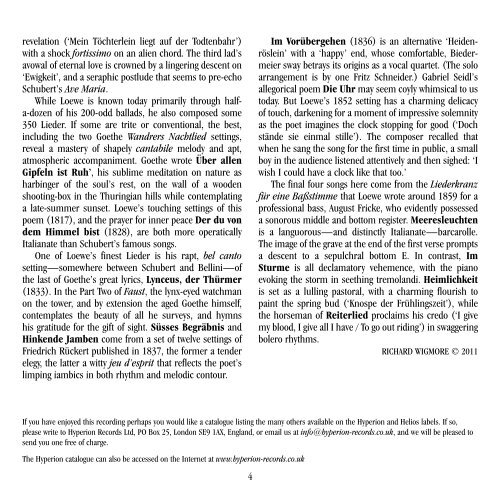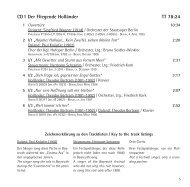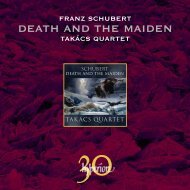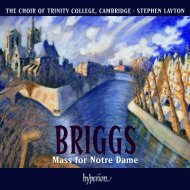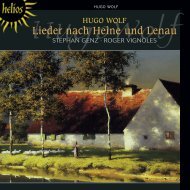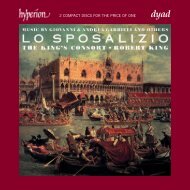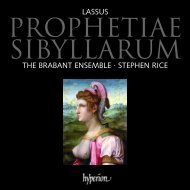Create successful ePaper yourself
Turn your PDF publications into a flip-book with our unique Google optimized e-Paper software.
evelation (‘Mein Töchterlein liegt auf der Todtenbahr’)<br />
with a shock fortissimo on an alien chord. The third lad’s<br />
avowal of eternal love is crowned by a lingering descent on<br />
‘Ewigkeit’, and a seraphic postlude that seems to pre-echo<br />
Schubert’s Ave Maria.<br />
While Loewe is known today primarily through halfa-dozen<br />
of his 200-odd ballads, he also composed some<br />
350 Lieder. If some are trite or conventional, the best,<br />
including the two Goethe Wandrers Nachtlied settings,<br />
reveal a mastery of shapely cantabile melody and apt,<br />
atmospheric accompaniment. Goethe wrote Über allen<br />
Gipfeln ist Ruh’, his sublime meditation on nature as<br />
harbinger of the soul’s rest, on the wall of a wooden<br />
shooting-box in the Thuringian hills while contemplating<br />
a late-summer sunset. Loewe’s touching settings of this<br />
poem (1817), and the prayer for inner peace Der du von<br />
dem Himmel bist (1828), are both more operatically<br />
Italianate than Schubert’s famous songs.<br />
One of Loewe’s finest Lieder is his rapt, bel canto<br />
setting—somewhere between Schubert and Bellini—of<br />
the last of Goethe’s great lyrics, Lynceus, der Thürmer<br />
(1833). In the Part Two of Faust, the lynx-eyed watchman<br />
on the tower, and by extension the aged Goethe himself,<br />
contemplates the beauty of all he surveys, and hymns<br />
his gratitude for the gift of sight. Süsses Begräbnis and<br />
Hinkende Jamben come from a set of twelve settings of<br />
Friedrich Rückert published in 1837, the former a tender<br />
elegy, the latter a witty jeu d’esprit that reflects the poet’s<br />
limping iambics in both rhythm and melodic contour.<br />
4<br />
Im Vorübergehen (1836) is an alternative ‘Heidenröslein’<br />
with a ‘happy’ end, whose comfortable, Biedermeier<br />
sway betrays its origins as a vocal quartet. (The solo<br />
arrangement is by one Fritz Schneider.) Gabriel Seidl’s<br />
allegorical poem Die Uhr may seem coyly whimsical to us<br />
today. But Loewe’s 1852 setting has a charming delicacy<br />
of touch, darkening for a moment of impressive solemnity<br />
as the poet imagines the clock stopping for good (‘Doch<br />
stände sie einmal stille’). The composer recalled that<br />
when he sang the song for the first time in public, a small<br />
boy in the audience listened attentively and then sighed: ‘I<br />
wish I could have a clock like that too.’<br />
The final four songs here come from the Liederkranz<br />
für eine Baßstimme that Loewe wrote around 1859 for a<br />
professional bass, August Fricke, who evidently possessed<br />
a sonorous middle and bottom register. Meeresleuchten<br />
is a languorous—and distinctly Italianate—barcarolle.<br />
The image of the grave at the end of the first verse prompts<br />
a descent to a sepulchral bottom E. In contrast, Im<br />
Sturme is all declamatory vehemence, with the piano<br />
evoking the storm in seething tremolandi. Heimlichkeit<br />
is set as a lulling pastoral, with a charming flourish to<br />
paint the spring bud (‘Knospe der Frühlingszeit’), while<br />
the horseman of Reiterlied proclaims his credo (‘I give<br />
my blood, I give all I have / To go out riding’) in swaggering<br />
bolero rhythms.<br />
RICHARD WIGMORE © 2011<br />
If you have enjoyed this recording perhaps you would like a catalogue listing the many others available on the Hyperion and Helios labels. If so,<br />
please write to Hyperion Records Ltd, PO Box 25, London SE9 1AX, England, or email us at info@hyperion-records.co.uk, and we will be pleased to<br />
send you one free of charge.<br />
The Hyperion catalogue can also be accessed on the Internet at www.hyperion-records.co.uk


